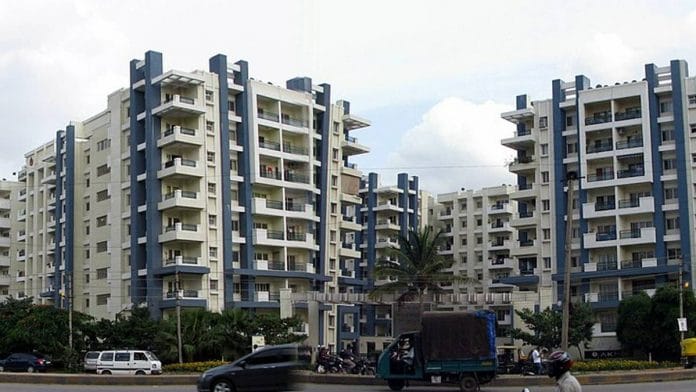New Delhi: The Centre has introduced a slew of measures, including making it mandatory for states to amend their existing tenancy law and reducing stamp duty to less than one percent for houses registered under the government’s affordable housing project, if they wish to avail benefits under the second edition of Pradhan Mantri Awas Yojana-Urban (PMAY-U 2.0).
The scheme, which was approved by the Union Cabinet last month and launched to provide houses to one crore eligible urban poor and middle-class families, is aimed at addressing the facilitation of affordable housing, especially rental housing, in cities.
The Ministry of Housing and Urban Affairs, which released the PMAY-U 2.0 guidelines last week, has put in place strict deadlines for states and Union Territories to implement nearly 15 urban reforms by June 2025.
A key reform deals with revamping the archaic tenancy law currently in place in several states. In connection with its focus on rental housing in cities, the Centre has directed the states to amend the existing law along the lines of the Model Tenancy Act (MTA), which was approved by the Union Cabinet in 2021. Only four-five states have adopted the Model tenancy Act so far, ThePrint has learnt.
Affordable Rental Housing, first introduced as a sub-scheme under the first leg of PMAY-U in June 2020 to provide houses to migrant workers, is now one of the four main categories in the new scheme.
MTA mandates written rental agreement between landlord and tenant, and caps security deposit at two months for residential and six months for commercial premises. Additionally, it specifies conditions for eviction of tenants, and setting up of a rent authority and courts for dispute resolution, among others.
As it is not binding on states to adopt MTA entirely, officials told ThePrint, state governments may come up with new legislation or amend existing law along the lines of MTA to safeguard the interests of both landlords and tenants. The Centre has given them time till June 2025.
“The existing tenancy laws in most states are very old due to which there are multiple disputes. The MTA was drafted to safeguard the interest of both sides and put in place a system to resolve disputes. But very few states have amended the law in the past three years. Therefore, it has been made mandatory for states to amend the legislation,” said a senior ministry official.
Only Tamil Nadu, Andhra Pradesh, Uttar Pradesh and Assam had amended the tenancy laws till the end of last year, according to MoHUA’s response to a question in the Lok Sabha in December 2023.
According to sources in the ministry, no other state has amended the law this year. The process is currently underway in Maharashtra, Kerala and Gujarat, among others.
A senior official in the Kerala government said, “We have drafted the new tenancy law. It has been sent for legal vetting.”
In Gujarat too, the government has initiated the process. Asked why it was not done earlier, a senior official in Gujarat’s urban development and urban housing department said, “Making changes in the law is a long process. We have been working on it for nearly a year now. Now that the Centre has made it mandatory, the new legislation will be notified soon.”
A senior official in Maharashtra told ThePrint that the process of amending the tenancy law has begun.
Also Read: Plan changes & lack of clarity, what’s causing delays in Delhi’s Central Vista revamp project
Changes in land development, property registration norms
In the new guidelines, the central government has also proposed a series of land reforms and changes in the property registration system to promote affordable housing.
States/UTs have until December-end to implement two crucial reforms—reduction of stamp duty or registration charges for houses registered under PMAY-U to “less than one percent”, and provision of 50 percent additional Floor Area Ratio (FAR) to developers for affordable housing projects.
“In many states, people have to pay around six-seven percent as stamp duty while registering their properties. The 50 percent additional FAR will help in construction of more affordable housing units,” said a senior housing ministry official.
The guidelines provide for inclusion of Affordable Housing Zones in the city’s master plans or Town Planning Schemes (TPS), allotment of land for development of affordable housing projects and creation of land banks for the same by mapping available land parcels in cities, among others.
The guidelines call for the exemption of all statutory charges, such as developmental charges, scrutiny charges, layout deposit and other related charges or fees.
To ensure construction of houses in a time-bound manner, the new scheme also provides for a single window system for approval of building plans and layouts within 60 days.
‘Slum redevelopment’ removed
Under PMAY-U 2.0, the Narendra Modi-led government has done away with the ‘slum redevelopment’ component—a part of the previous edition, aimed at “provision of land rights/patta by state/UT to landless for construction of affordable housing”, according to the guidelines.
In many states, such as Odisha, Madhya Pradesh and Punjab, the governments either give land ownership to slum dwellers or provide them with vacant land free-of-cost for rehabilitation.
But some states do not have the policy to allot land to slum dwellers. The Gujarat government official said, “We don’t have a policy for giving land parcels to slum residents or economically weaker sections. We have a policy for giving houses at affordable rates in multi-storeyed apartments constructed by the state government agencies, such as urban local bodies. After a survey of eligible beneficiaries, houses are provided at affordable rates to them.”
(Edited by Mannat Chugh)
Also Read: Centre announces Rs 70,125 cr scheme to extend road network, connect 25,000 remote villages






